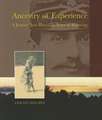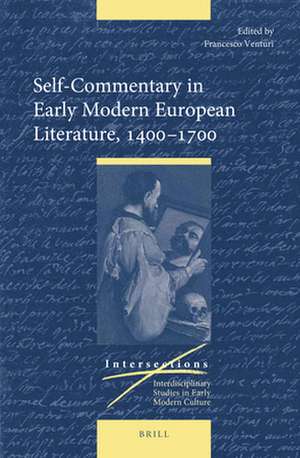Self-Commentary in Early Modern European Literature, 1400–1700: Intersections, cartea 62
Editat de Francesco Venturien Limba Engleză Hardback – 28 mai 2019
Contributors are Harriet Archer, Gilles Bertheau, Carlo Caruso, Jeroen De Keyser, Russell Ganim, Joseph Harris, Ian Johnson, Richard Maber, Martin McLaughlin, John O’Brien, Magdalena Ożarska, Federica Pich, Brian Richardson, Els Stronks, and Colin Thompson.
Din seria Intersections
-
 Preț: 217.51 lei
Preț: 217.51 lei -
 Preț: 174.49 lei
Preț: 174.49 lei -
 Preț: 200.26 lei
Preț: 200.26 lei -
 Preț: 215.61 lei
Preț: 215.61 lei -
 Preț: 98.61 lei
Preț: 98.61 lei -
 Preț: 192.18 lei
Preț: 192.18 lei -
 Preț: 154.86 lei
Preț: 154.86 lei -
 Preț: 116.09 lei
Preț: 116.09 lei - 18%
 Preț: 1074.49 lei
Preț: 1074.49 lei -
 Preț: 241.64 lei
Preț: 241.64 lei -
 Preț: 241.64 lei
Preț: 241.64 lei -
 Preț: 228.96 lei
Preț: 228.96 lei -
 Preț: 229.55 lei
Preț: 229.55 lei -
 Preț: 241.64 lei
Preț: 241.64 lei -
 Preț: 226.67 lei
Preț: 226.67 lei -
 Preț: 107.21 lei
Preț: 107.21 lei -
 Preț: 208.79 lei
Preț: 208.79 lei -
 Preț: 201.78 lei
Preț: 201.78 lei -
 Preț: 226.85 lei
Preț: 226.85 lei -
 Preț: 225.71 lei
Preț: 225.71 lei -
 Preț: 246.63 lei
Preț: 246.63 lei - 47%
 Preț: 319.92 lei
Preț: 319.92 lei - 7%
 Preț: 315.66 lei
Preț: 315.66 lei -
 Preț: 96.10 lei
Preț: 96.10 lei - 18%
 Preț: 1201.75 lei
Preț: 1201.75 lei - 18%
 Preț: 659.69 lei
Preț: 659.69 lei - 18%
 Preț: 693.26 lei
Preț: 693.26 lei - 18%
 Preț: 1049.43 lei
Preț: 1049.43 lei - 18%
 Preț: 698.32 lei
Preț: 698.32 lei - 18%
 Preț: 681.99 lei
Preț: 681.99 lei - 18%
 Preț: 687.25 lei
Preț: 687.25 lei - 18%
 Preț: 820.59 lei
Preț: 820.59 lei - 18%
 Preț: 683.37 lei
Preț: 683.37 lei - 18%
 Preț: 667.86 lei
Preț: 667.86 lei
Preț: 822.70 lei
Preț vechi: 1003.29 lei
-18% Nou
Puncte Express: 1234
Preț estimativ în valută:
157.45€ • 163.13$ • 131.40£
157.45€ • 163.13$ • 131.40£
Carte indisponibilă temporar
Doresc să fiu notificat când acest titlu va fi disponibil:
Se trimite...
Preluare comenzi: 021 569.72.76
Specificații
ISBN-13: 9789004346864
ISBN-10: 9004346864
Dimensiuni: 155 x 235 mm
Greutate: 1.02 kg
Editura: Brill
Colecția Brill
Seria Intersections
ISBN-10: 9004346864
Dimensiuni: 155 x 235 mm
Greutate: 1.02 kg
Editura: Brill
Colecția Brill
Seria Intersections
Cuprins
Acknowledgements
List of Illustrations
Notes on the Editor
Notes on the Contributors
Introduction
Francesco Venturi
1 Alberti’s Commentarium to His First Literary Work: Self-Commentary as Self-Presentation in the Philodoxeos
Martin McLaughlin
2 Elucidation and Self-Explanation in Filelfo’s Marginalia
Jeroen De Keyser
3 Vernacular Self-Commentary during Medieval Early Modernity: Reginald Pecock and Gavin Douglas
Ian Johnson
4 On the Threshold of Poems: a Paratextual Approach to the Narrative/Lyric Opposition in Italian Renaissance Poetry
Federica Pich
5 Self-Commentary on Language in Sixteenth-Century Italian Prefatory Letters
Brian Richardson
6 ‘All Outward and on Show’: Montaigne’s External Glosses
John O’Brien
7 Companions in Folly: Genre and Poetic Practice in Five Elizabethan Anthologies
Harriet Archer
8 The Journey of the Soul: The Prose Commentaries on His Own Poems by St John of the Cross
Colin P. Thompson
9 Blood, Sweat, and Tears: Annotation and Self-Exegesis in La Ceppède
Russell Ganim
10 Can a Poet be ‘Master of [his] owne Meaning’? George Chapman and the Paradoxes of Authorship
Gilles Bertheau
11 Critical Failures: Corneille Observes His Spectators
Joseph Harris
12 Self-Criticism, Self-Assessment, and Self-Affirmation: The Case of the (Young) Author in Early Modern Dutch Literature
Els Stronks
13 Reading the Margins: The Uses of Authorial Side Glosses in Anna Stanisławska’s Transaction (1685)
Magdalena Ożarska
14 Mockery and Erudition: Alessandro Tassoni’s Secchia rapita and Francesco Redi’s Bacco in Toscana
Carlo Caruso
Afterword
Richard Maber
Index Nominum
List of Illustrations
Notes on the Editor
Notes on the Contributors
Introduction
Francesco Venturi
1 Alberti’s Commentarium to His First Literary Work: Self-Commentary as Self-Presentation in the Philodoxeos
Martin McLaughlin
2 Elucidation and Self-Explanation in Filelfo’s Marginalia
Jeroen De Keyser
3 Vernacular Self-Commentary during Medieval Early Modernity: Reginald Pecock and Gavin Douglas
Ian Johnson
4 On the Threshold of Poems: a Paratextual Approach to the Narrative/Lyric Opposition in Italian Renaissance Poetry
Federica Pich
5 Self-Commentary on Language in Sixteenth-Century Italian Prefatory Letters
Brian Richardson
6 ‘All Outward and on Show’: Montaigne’s External Glosses
John O’Brien
7 Companions in Folly: Genre and Poetic Practice in Five Elizabethan Anthologies
Harriet Archer
8 The Journey of the Soul: The Prose Commentaries on His Own Poems by St John of the Cross
Colin P. Thompson
9 Blood, Sweat, and Tears: Annotation and Self-Exegesis in La Ceppède
Russell Ganim
10 Can a Poet be ‘Master of [his] owne Meaning’? George Chapman and the Paradoxes of Authorship
Gilles Bertheau
11 Critical Failures: Corneille Observes His Spectators
Joseph Harris
12 Self-Criticism, Self-Assessment, and Self-Affirmation: The Case of the (Young) Author in Early Modern Dutch Literature
Els Stronks
13 Reading the Margins: The Uses of Authorial Side Glosses in Anna Stanisławska’s Transaction (1685)
Magdalena Ożarska
14 Mockery and Erudition: Alessandro Tassoni’s Secchia rapita and Francesco Redi’s Bacco in Toscana
Carlo Caruso
Afterword
Richard Maber
Index Nominum
Notă biografică
Francesco Venturi, PhD (2012, University of Siena), is Associate Professor of Italian Literature at the University of Oslo. He has published widely in the field of early modern and twentieth-century literature and culture, including the monograph Genesi e storia della ‘trilogia’ di Andrea Zanzotto (ETS, 2016).
Recenzii
"Its wide-ranging aspect is what makes this work thought provoking, demanding, and well worth the effort."
Barbara A. Goodman, Clayton State University, in Seventeenth-Century News 78.1-2, pp. 59-63
"[a] splendid collection of essays on authorial self-commentary [...] The fertile insights and extensive bibliographies that mark every contribution to the volume make it required reading for historians of Renaissance and Reformation literature."
William J. Kennedy, Cornell University, in Renaissance and Reformation 43.1, pp. 294-296
Barbara A. Goodman, Clayton State University, in Seventeenth-Century News 78.1-2, pp. 59-63
"[a] splendid collection of essays on authorial self-commentary [...] The fertile insights and extensive bibliographies that mark every contribution to the volume make it required reading for historians of Renaissance and Reformation literature."
William J. Kennedy, Cornell University, in Renaissance and Reformation 43.1, pp. 294-296
